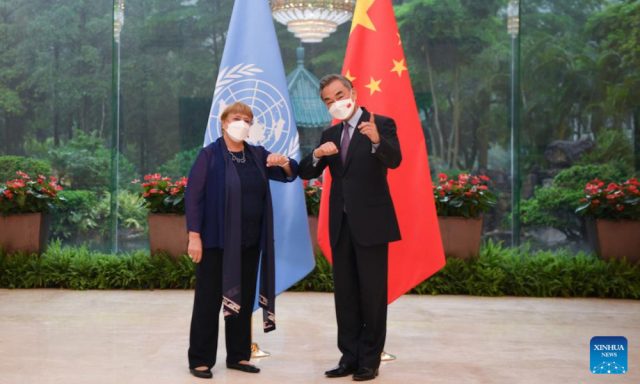By Choekyi Lhamo
The controversial visit to China by the United Nations Human Rights High Commissioner Michelle Bachelet has drawn heavy criticism for side-lining human rights issues during her meeting with top Chinese leaders. The human rights chief did not visit occupied Tibet, but only mentioned the sensitive region in her closing statement, “In Tibet Autonomous Region, it is important the linguistic, religious and cultural identity of Tibetans be protected, and that Tibetan people are allowed to participate fully and freely in decisions about their religious life and for dialogue to take place. I discussed education policies in the TAR and stressed the importance of children learning in their own language and culture in the setting of their families or communities.”
Rights groups have expressed huge disappointment over her lack of concern about the pressing issues that need immediate attention. The US-based International Campaign for Tibet said that the recent visit has become a ‘political victory’ for the Communist regime. “The high commissioner’s failure to report truthfully and without fear on the human rights situation in China is a gross dereliction of her duty . . . Bachelet’s only two sentences on the situation in Tibet are utterly unacceptable and severely erode human rights standards and institutions,” stated ICT on Saturday.
The central focus of her China visit was East Turkestan (Ch: Xinjiang), where observers say a “genocide” of Uyghur Muslim community is taking place under Chinese rule. Bachelet addressed the attacks on the Uyghurs in the context of “de-radicalization measures” and portrayed China as a proponent of a unique, multi-layered society.
“I encouraged the Government to undertake a review of all counter terrorism and de-radicalization policies to ensure they fully comply with international human rights standards, and in particular that they are not applied in an arbitrary and discriminatory way,” she said, noting that exiled Uyghurs should be considered a priority and that the authorities should subsequently assist them in contacting their respective families.
The US State Department slammed the visit saying that it has attempted to whitewash the entire human rights discourse. Secretary Antony Blinken said that the US has reason to believe that the Beijing authorities have manipulated high commissioner’s visit, “The US remains deeply concerned about the human rights situation in the PRC, particularly in light of new reports that offer further proof of arbitrary detentions among the more than one million people detained in Xinjiang . . . We again call on the PRC to immediately cease its atrocities in Xinjiang, release those unjustly detained, account for those [who] disappeared, and allow independent investigators unhindered access to Xinjiang, Tibet, and across China.”













